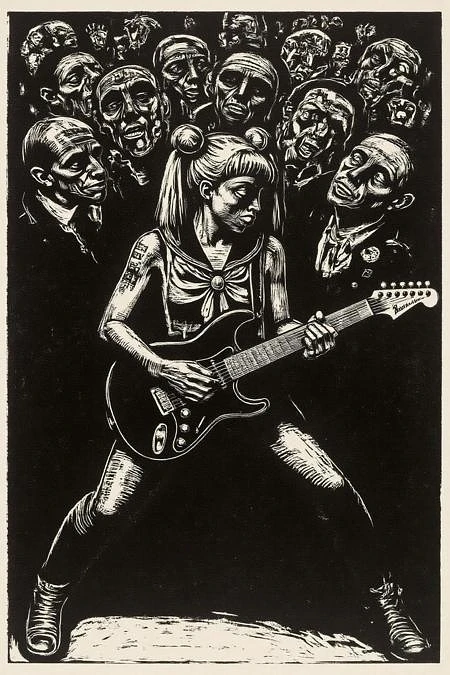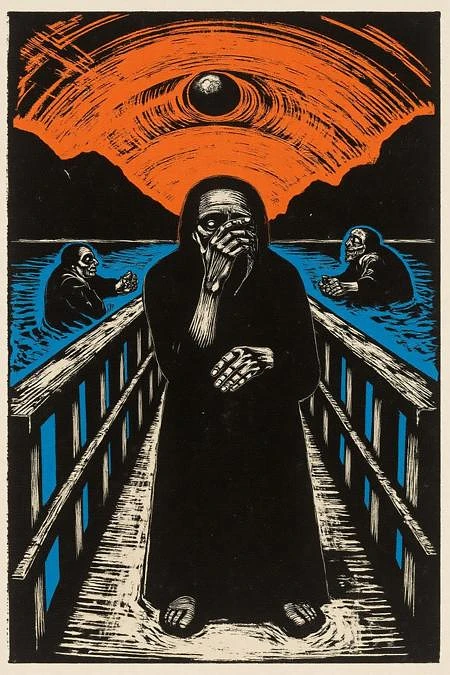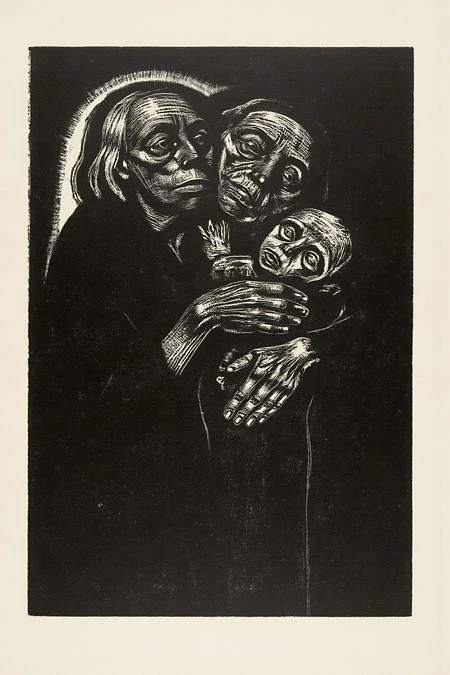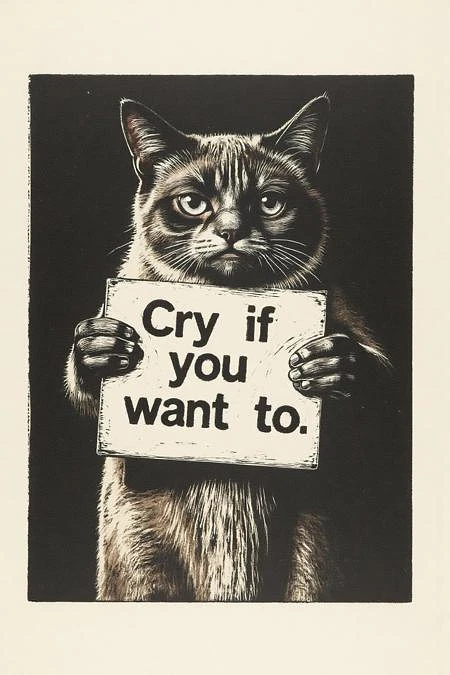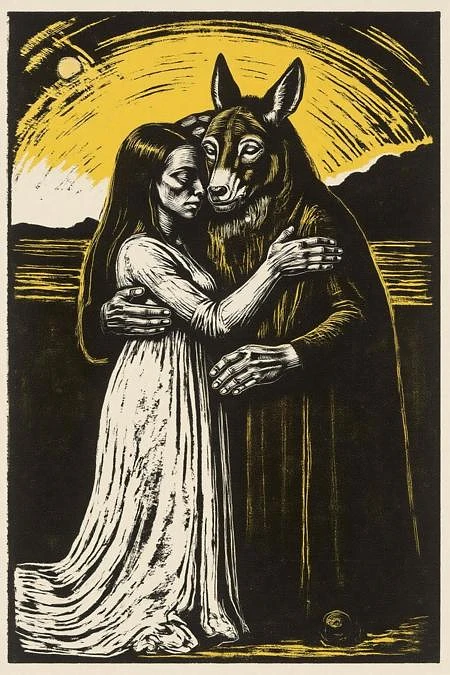Käthe Kollwitz Woodcut Print Style: Danse Macabre
v1.0Trained on 13 woodcut prints by the inimitable Käthe Kollwitz. Please go to https://www.kollwitz.de to check out her powerful, moving body of work.
If you thought my last Kollwitz LoRa was depressing, I've got bad news for you – this one is even worse. For most prompts, the images look ominous, as if disaster and death is just around the corner. You've been warned 😅. So I decided to name it Danse Macabre.
Known problems:
The LoRA has a tendency to generate two people when there should just be one. This is due to the training set containing many images with subjects hugging each other (one of them is often Death).
Faces are often sinister or demonic, this is a feature, not a bug.
Hands are often skeletal. Again, this is a feature 😎
From ChatGPT:
Käthe Kollwitz (1867/07/08–1945/04/22) was a German artist and printmaker renowned for her emotionally powerful works that depict the struggles of the working class, the impacts of war, and the plight of women and children. Through her exceptional skill in etching, lithography, woodcut, and sculpture, Kollwitz became one of the most influential artists of her time, blending social critique with deep human empathy.
Early Life
-
Birth and Family:
Born on July 8, 1867, in Königsberg, East Prussia (modern-day Kaliningrad, Russia), as Käthe Schmidt.
Her family was progressive, socially conscious, and supportive of her artistic talents.
-
Education:
Studied at the Women’s Art School in Berlin and later at the Munich School for Women Artists.
Influenced by realist painters and printmakers like Max Klinger, whose work emphasized the human condition.
-
Marriage:
Married Karl Kollwitz, a physician who treated working-class patients. His dedication to the poor greatly influenced Käthe’s themes of social injustice.
Artistic Career
-
Themes:
Social Struggles: Her early work focused on the hardships of the working class, inspired by her husband’s patients and the growing socialist movement.
War and Loss: The devastating impact of World War I and the death of her son Peter at the front deeply influenced her later works.
Motherhood and Suffering: Her portrayals of mothers protecting their children and grieving families became iconic.
-
Mediums:
Printmaking: Käthe excelled in etching, lithography, and woodcuts, which were well-suited to her expressive, stark, and impactful style.
Sculpture: Later in life, she created sculptures that carried the same emotional weight as her prints.
-
Signature Works:
Weavers' Revolt (1893–1897): A series of etchings depicting the struggles of Silesian weavers and their uprising against oppression.
Peasant War (1902–1908): A series inspired by the German Peasants' War, emphasizing resistance and sacrifice.
The Mourning Parents (1932): A sculpture memorializing her son Peter, located in a military cemetery in Belgium.
War (1922–1923): A series of woodcuts expressing the devastating human cost of World War I.
Impact of War
-
World War I:
The loss of her son Peter in 1914 deeply affected her. Much of her later work reflected the grief and suffering caused by war.
She became an outspoken pacifist, using her art to advocate against violence.
-
World War II:
Kollwitz’s anti-war stance and association with leftist politics made her a target under the Nazi regime.
Her art was banned, and she was removed from her teaching position. Despite this, she continued working in isolation.
Legacy and Style
-
Artistic Style:
Kollwitz’s work is characterized by its emotional depth, stark realism, and empathetic portrayal of human suffering.
Her figures are often monumental, with expressive faces and hands conveying grief, resilience, and dignity.
-
Humanitarian Focus:
She used her art as a tool for social change, giving voice to the voiceless and shining a light on injustice.
Her deeply personal and universal themes of love, loss, and resilience continue to resonate.
-
Recognition:
Kollwitz became the first woman elected to the Prussian Academy of Arts in 1919, although she was forced to resign in 1933 under Nazi pressure.
Her work has been exhibited in major museums and remains a symbol of anti-war and humanitarian advocacy.
-
Death:
Käthe Kollwitz died on April 22, 1945, just weeks before the end of World War II, in Moritzburg, Germany.
Major Works
The Grieving Parents (Sculpture, 1932): A tribute to her son, representing universal mourning.
The Volunteers (Woodcut, 1922): Depicts young men enthusiastically going to war, with death as their leader.
Mother with Dead Child (Etching, 1903): A raw and haunting portrayal of a mother mourning her child.
Influence and Legacy
Käthe Kollwitz’s art continues to inspire with its timeless message of compassion, humanity, and resistance against injustice. Her work stands as a powerful testament to the human cost of war and the resilience of the human spirit.
Popularity
Info
Version v1.0: 1 File
About this version: v1.0
This is epoch 11. Epoch 10 is pretty good too. Epoch 11 maybe slightly overtrained but I found it more "powerful" than Epoch 10. All epochs past 11 seems to be way overtrained, but if you are curious you can find them at tensor. art/models/817596339878691887/Kathe-Kollwitz-W3-CapD6A3Cos5-2025-01-11-21:03:34-Ep-11
LUX.1 - dev-fp8
Trigger: kako1 woodcut print
Repeat: 20 Epoch: 17 (Trained on 13 512x512 images for total of 4420 steps)
Unet LR: 0.0005 Scheduler: cosine Optimizer: AdamW
Network Dim: 6 Alpha: 3
Epoch Loss
1 0.350
...
8 0.285
9 0.267
10 0.249 epoch 10 or 11 is probably the best, after that it seems that
11 0.223 it always produces two people with the prompt?!
12 0.208
13 0.197
14 0.179
15 0.171 <- lowest
16 0.182 <-
17 0.173
1 Version
Go ahead and upload yours!
